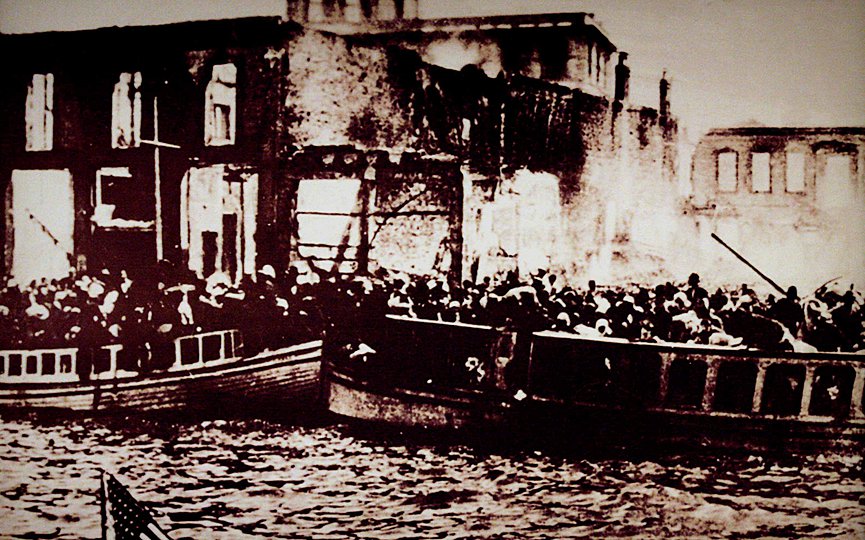General News
Meropi Kyriacou Honored as TNH Educator of the Year
NEW YORK – Meropi Kyriacou, the new Principal of The Cathedral School in Manhattan, was honored as The National Herald’s Educator of the Year.

The commemorations of the centenary of the burning of Smyrna in 1922, the culmination of the Asia Minor Disaster, are underway. They will continue over the next month and peak in September, which is the month Turkish forces entered the city and destroyed it in 1922.
Last year, the celebrations of the bicentennial of the 1821 revolution coalesced around emphasizing its international dimension. We are about to find out what directions the commemorations of 1922 will take. My own view is that the best way to remember those events in Smyrna and honor all those who lost their lives or were uprooted is to recall the way the Greeks thrived in the city’s cosmopolitan environment.
I have already presented this view in some of the early commemorative events that have taken place. The first was a public conversation with Kathimerini journalist Margarita Pournara hosted by the Hellenic American Union in Athens.
The Union is an important educational and cultural institution with ties to the United States. Among its many activities this year, by way of observing its own commemoration, it is organizing a series of six conversations between Pournara and persons familiar with the city’s history before, during and after 1922. The series will run from March through May.
The program is titled ‘Meetings with a View’ because they are being held on the top floor of the Union’s building whose large windows afford a panoramic view of the city of Athens. Because of COVID protocols the conversations take place before a limited audience and are also being streamed live and recorded.
Ms. Pournara, an experienced and lively interlocutor, asked me a key question during a conversation, whether Smyrna was a Greek city prior to 1922. I answered that it was a Greek city in some ways, but it was also a cosmopolitan city.
The city, I explained, was above all one of the most important commercial ports of the Ottoman Empire, and the gateway to western markets for all its exports. As such, it inevitably contained not only Muslims but also Armenians, Greeks, and Jews many of whom enacted the trade. Smyrna also attracted European and American merchants and missionaries. Their relatively harmonious coexistence was a prerequisite for the city’s prosperity.
The Greeks were the largest ethnic group in the city although the Muslims were almost as many. The Smyrna Greeks were not only dominant in commerce but had also established schools which were on a par with those of Athens. There was a rich Greek cultural and literary tradition in the city, and Smyrna’s Amaltheia newspaper was one of the most authoritative in the entire Hellenic world.
Yet the foundation stone of all the Greeks achieved in the city was their ability to cooperate and interact with the other ethnic groups who lived and worked there. While the Greek presence retained its identity, Greeks married, went into partnerships, did business with, and socialized with non-Greeks, on a daily basis.
All this was lost in 1922 when a genocidal wave swept away the Armenians, the Greeks, and many other non-Muslims and the city’s European character was engulphed in flames. There were other port cities in that part of the world that over time lost their cosmopolitan character such as Alexandria, Odessa, and Salonica – but none suffered the dramatic end that Smyrna did.
And yet, I believe, while the cosmopolitanism in those cities disappeared, its spirit did not – it migrated westward and found a new home in cities such as London, New York, Los Angeles, and Melbourne, all with thriving Greek communities. And therefore, let’s look beyond the flames and those awful plumes of smoke that smothered Smyrna and when we remember 1922 let’s honor not only what was lost but also what remained.
I try to convey my own preference for emphasizing that what happened in Smyrna in 1922 was the end of a cosmopolitan world in which Hellenism thrived, but despite the loss, that world functions as a reminder of the dynamism and possibilities in Hellenism and humanity.
I echoed this idea at another commemorative event, a Zoom lecture co-hosted by the General Consulate of Greece in Boston and College Year in Athens (CYA), the educational institution at which students from American universities study during their semester abroad. Fotini Christia, a political science professor at MIT was the discussant and commented along the same lines. Judging from the reactions of the audience, the idea of remembering and being inspired by the cosmopolitan spirit was warmly welcomed.
No doubt some commemorations might take a different direction. But as we witness continued nationalist and ethnic conflicts in the twenty-first century, we should not forget the way nationalities co-existed in cosmopolitan Smyrna.
NEW YORK – Meropi Kyriacou, the new Principal of The Cathedral School in Manhattan, was honored as The National Herald’s Educator of the Year.

MELBOURNE, Australia (AP) — More than 100 long-finned pilot whales that beached on the western Australian coast Thursday have returned to sea, while 29 died on the shore, officials said.
"How did you find Greece?" a friend asked me, after my recent return to New York from a trip there.
On Monday, April 22, 2024, history was being written in a Manhattan courtroom.
PARIS - With heavy security set for the 2024 Paris Olympic Games during a time of terrorism, France has asked to use a Greek air defense system as well although talks are said to have been going on for months.
PARIS (AP) — Paris has a new king of the crusty baguette.